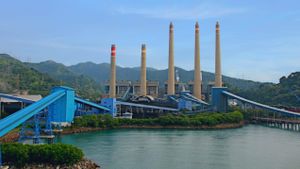JAKARTA - The Ministry of Finance (Kemenkeu) highlighted the development of Indonesia's manufacturing sector which has consistently been in the expansion zone for thirteen consecutive months and has continued to strengthen in the last two months.
Head of the Fiscal Policy Agency (BKF) of the Ministry of Finance, Febrio Kacaribu, said that the manufacturing Purchasing Managers (PMI) increased significantly again in September to level 53.7 compared to August which was 51.7.
Increasing manufacturing expansion shows the continued strengthening of domestic demand and exports. This of course deserves appreciation because it occurs amidst the global risk that is still escalated," he said on Wednesday, October 5.
According to Febrio, this brilliant nick cannot be separated from the government's intervention in an effort to keep the business climate stable.
"Government policies for those that absorb global risk (short Absorber) have proven effective in maintaining the momentum of strengthening the national economic recovery," he said.
It was explained that the trend of strengthening PMI was also experienced by several ASEAN countries, such as Thailand 55.7 (August: 53.7) and the Philippines 52.9 (August: 51.2). Meanwhile, China's manufacturing PMI has again contracted 48.1 (August: 49.5).
Furthermore, Febrio revealed that the strengthening of manufacturing sector activities is in line with the decline in input price pressures in the last two years. Overall, business sentiment in Indonesia's manufacturing sector has maintained positively supported by increasingly strong and sustainable recovery expectations on the demand side.
"Optimizing the state budget as a carbon shock this year and next year is expected to continue to maintain a positive trend in public demand to support optimism in the business sector," he stressed.
Sri Mulyani's subordinates explained, in terms of inflation as of September 2022, it was recorded at 5.95 percent year on year (yoy). The book is claimed to be lower than the previous Ministry of Finance estimates after the adjustment of domestic fuel prices.
Then, Febrio also said that the government had made various efforts to reduce the impact of inflation, including by allocating public transportation subsidy assistance, transportation costs, wage subsidies, and BLT fuel to maintain people's purchasing power. In addition, food inflation continues to be controlled to maintain access to food needs.
The role of the Central Inflation Control Team (TPIP) and the Regional Inflation Control Team (TPID) have succeeded in maintaining volatile food inflation. This good performance needs to be maintained and improved. Evidently, around 40 regions have been able to keep the inflation rate lower than the national inflation rate. In the future, inflationary pressures related to seasonal effects, especially the rainy season, still need to be watched out for together," concluded the Head of BKF Febrio Kacaribu.
The English, Chinese, Japanese, Arabic, and French versions are automatically generated by the AI. So there may still be inaccuracies in translating, please always see Indonesian as our main language. (system supported by DigitalSiber.id)










